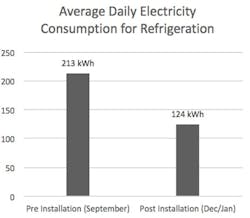From the floor of IRE 2020, Reed Hitchcock, executive vice president of the Asphalt Roofing Manufacturers Association (ARMA) chats with BUILDINGS editor-in-chief Janelle Penny about cool roofing, California initiatives and the dialogue being had across the country about what’s happening in the industry. Listen now.
[Start transcript]
Janelle Penny: This is Janelle Penny, editor-in-chief of BUILDINGS, and I’m here with Reed Hitchcock, who is the executive vice president of the Asphalt Roofing Manufacturers Association or ARMA. This podcast is brought to you in partnership with ARMA, and today, we’re going to be talking about cool roofing. Reed, thanks for joining me.
Reed Hitchcock: Thank you.
Janelle: How’s the show going so far?
Reed: Good, good. You know, it’s nice to bring the show to a new city. These shows tend to fluctuate between the big convention centers, Orlando and Vegas. I think you’ve got a little bit of energy like we did last year for Nashville. All of my members are really positive about the show and the turnout.
Janelle: What’s on your agenda this week?
Reed: One of our key things, other than just seeing what’s going on in the industry—we do have our annual Excellence in Asphalt Roofing Awards and at this show we present those awards to the recipients in the company booth for the manufacturers of the products that are put on.
The contractors are really the award winners, but we do highlight the manufacturers that produce those materials for that. So, that’s a big focus for us.
And this is just a great opportunity for us as the trade association to connect with our members outside of a regular association meeting environment, and just talk to them about how their business is going and find out what’s keeping them up at night. And so, those are sort of the key areas for us at this.
Janelle: Great. What are some of the new developments in cool roofs that you’re noticing, and have you noticed that changing at all?
Reed: Just more talk about it. There’s an initiative in California right now that we’re paying attention to and actually, we’ve got a whole group of associations talking about cool roofs right now around this California initiative. It’s a proposed legislation to mandate certain activities related to cool roofs that would traditionally have fallen under the scope of the California Energy Commission.
Our issue is the whole issue of mandate. And so, we’ve got a group of different product manufacturers—so it includes asphalt roofing, it includes tile roofing, it includes the polyiso manufacturers, EPDM people—it’s focused on steep slope. But what starts on one side often permeates to the other side. And the message we’re trying to deliver is one of, you know, certainly cool roofs have tremendous value, and all of our manufacturers produce them—one type or another.
But you do need to pay close attention to the building and the entire energy footprint of the building. So, we were trying to emphasize what we call a “whole building approach” to looking at cool roofing and making sure that the roof fits the building.
But broader, I think we’re seeing new surfacing technologies. We’re seeing manufacturers are continuing to push the envelope in terms of reflectance numbers and the methods that they’re achieving it with. Obviously, we see more flexibility on the low-slope side of things. That’s where the values tend to be much higher on steep slope roofing. Manufacturers are pushing materials, R&D testing, over 40%. So, there are definitely products that we look forward to coming to market that will get to these higher reflectance values.
But it’s a dialogue around the country. Different areas are—as I’m sure you’re aware—implementing cool roof regs, major cities—New York, Philadelphia, LA—we’re seeing these things.
And so, certainly we’re prepared to respond. But we do want to make sure that the right roof is put on the building in question in any of those places.
Janelle: Right. Great. How has that changed over the last few years? What have you noticed?
Reed: Just more dialogue about it, really. We were seeing just a few weeks ago—the governor of California, another California issue—in his preliminary budget draft included earmarks for incentives for cool surfacing.
So again, as long as it doesn’t require use, that’s a great opportunity for the roofing industry to help get the products onto those buildings where they’ll make a difference—homes and buildings—where they’ll make a difference.
Other changes again, it’s just a matter of more colors being available, more options being available, and that’s across the whole industry. It’s amazing now to me just looking around our members booth, what can be done with it with asphalt.
Janelle: Right.
Reed: Especially, you know, everybody thinks asphalt is black. But you can do some pretty amazing reflectance things with it.
Janelle: Awesome. Are you seeing any other trends emerging?
Reed: A few. One that comes to mind is on the shingle side. We’re seeing more and more interest in manufacturers moving or producing polymer-modified shingles. What was formerly more of a niche product really focused in hail-prone regions, is becoming a more mainstream product. That technology is exciting and allows for more flexibility in some of the asphalt.
Asphalt supply is tough because you get such varying degrees of quality in the asphalt and that’s out of your control. And the polymer modification is a great process for sort of improving that material, especially some of those poor-quality materials that end up in companies’ tanks.
Janelle: Right.
Reed: That’s the key sort of development that I’m seeing. And I think what we’re hearing about and we’ll hear more about is companies putting in R&D work to new types of materials. They’re looking at other binders besides asphalt. Nothing that’s in front of us today, but we might see shingle composition changing in a lot of ways or at least expanding. I’m sure, no doubt, that asphalt will remain a constant.
I think the other one that I would point to is the trend toward recycled content. I know manufacturers are spending a lot of time and energy looking at how they can bring more recycled content into their materials. And that’s not only things like plastics that can play a role, but even tear-off roofing is processed in certain ways, can go back into the shingle manufacturing process and the modified bitumens.
Janelle: Great. So, where can we learn more?
Reed: www.asphaltroofing.org.
Janelle: Great. Reed, thank you so much for joining us.
Reed: I appreciate your time. Thank you.
Janelle: Thank you.
[End of transcript]
Like what you hear? Check out our other podcasts here.
About Reed Hitchcock:
Reed works closely with ARMA’s Executive Committee, Board of Directors, and Committees to improve, establish, and maintain best practices in planning, management, and implementation of association programs and services.
Throughout his career, Reed has served as senior staff executive and industry spokesperson for trade associations and professional societies and has managed key industry initiatives including product performance, codes and standards, and environmental issues.
About the Author
Janelle Penny
Editor-in-Chief at BUILDINGS
Janelle Penny has been with BUILDINGS since 2010. She is a two-time FOLIO: Eddie award winner who aims to deliver practical, actionable content for building owners and facilities professionals.

